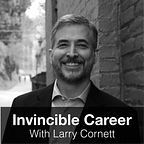
A friend of mine made a significant career pivot years ago. He decided that he wanted more out of work and life, so he invested in himself and went after it. He’s been very successful!
However, he discovered that odd experience which sometimes happens when you change, grow, and move in a new direction. His old friends wanted to hold him back. Sadly, he found that he had to create a new circle of friends who were just as ambitious as he is.
I've experienced this a few times in my life when I made significant career changes. Many of my old acquaintances faded out of my life.
Once we no longer had the bond of a shared office or similar work, we lost touch. Once I could no longer help people with my position, I wasn’t viewed as someone useful who could be leveraged.
A few of my friends stayed by my side. They were friends with "me," not my job title. We've stayed in touch for several years and catch up when we can. They are supportive of my new lifestyle and business.
Surprisingly, a tiny number of people are directly antagonistic. They mock my new business and seem upset about my lifestyle changes. They’ve said that I was crazy to throw away all of the progress in my previous career.
So, like my friend, I had to find a new tribe. I created a new circle of friends and colleagues who were more supportive.
I did it because it's so tough to succeed alone. I'm not talking about having business partners or employees. I'm also not talking about your boss or coworkers because:
Work is a competitive environment where only a few people can get promoted.
You can't openly share your fear, uncertainty, or doubt without some sort of repercussions.
Most people have mediocre bosses — or even downright bad ones — who aren't exactly supportive and nurturing.
I'm talking about finding your professional support network. Finding your tribe of people who want to see you succeed. Becoming part of a community that wants to help you grow.
“A tribe is a group of people connected to one another, connected to a leader, and connected to an idea. For millions of years, human beings have been part of one tribe or another. A group needs only two things to be a tribe: a shared interest and a way to communicate.”
― Seth Godin
Your tribe is a small group of people who:
Provide guidance because many of us are at different points in our journeys
Act as a confidential sounding board for your important decisions
Answer your questions, no matter how crazy they might seem
Support each other in their goals because you're all on similar paths
Help you with connections and resources
Have your best interests in mind and lift you up when you're feeling discouraged
It can't be too large (e.g., all of your connections on Twitter, LinkedIn, or Facebook won’t work well for this purpose). You need a certain degree of intimacy to ensure that people are really committed to helping each other.
I’m guessing that you’ve already experienced the pros and cons of being part of a community at some point in your life. But, our early experiences with them aren’t exactly the same as later experiences with communities you intentionally choose to join.
Early community experiences
Our early experiences with communities were not entirely under our control. As children, we lived in the communities where our parents chose to make our homes.
Most of us went to schools where we encountered yet another community. Again, we did not have much choice in this. Perhaps your parents intentionally selected your school and, therefore, your community of peers. In my case, our tiny town had one public school. No choice.
My “community experience” wasn’t the best. I go into more detail in the audio version (scroll up to play) because it’s easier to explain things verbally instead of trying to capture it all in text.
Later in life, you probably selected your college or university for advanced education. Although you couldn’t choose which students attended classes with you, you could form your own circles of friends and study groups.
Again, I explain this better in the audio version. I initially made some big mistakes in forming my “tribe” at the university. I finally got it right later, but it took a lot of work to reverse that disaster!
When you start working for employers in your given profession, you discover that — once again — you’re not in full control of your community of peers and coworkers. But, you have to make the best of it.
Sometimes it works out, but sometimes it can lead you astray if you join a tribe of people with goals that aren’t completely aligned with yours. In the “old days,” it was a bit more challenging to find a great community outside of work.
Now, the internet has made that a lot easier. Tightly-focused global communities are discoverable at your fingertips. Perhaps this introduces a new challenge that makes it difficult again. There are thousands and thousands of communities scattered across hundreds of platforms!
You may have to explore and try a few before you find one that meets your needs. But, as you may have heard or read in my recent conversation with Sam Sycamore, joining and engaging with the right community can make all the difference in your professional life and career.
How community helps you
Surveyed community members said that their communities empower them in the following ways (source):
Asking questions (76%)
Providing solutions (68%)
Connecting (65%)
Being heard (61%)
Feeling seen (60%)
“You just need a few people — who will look at the rules, realize they make no sense, and realize how much they want to be connected.”
— Seth Godin, from his TED talk: The tribes we lead
How can a community make a difference in your life, both professionally and personally? Believe me; it is very different than the group of people you’ve let into your social media circles. Of course, there may be some overlap, but the tighter focus and intentionality of a community/tribe is uniquely valuable.
You share similar goals and are committed to helping each other achieve them.
You often share similar career paths, too, so people who are further along can help you with advice, guidance, feedback, resources, connections, and more.
You have a shared agenda vs. the hidden ones that often exist at work. People in your tribe aren’t competing with you. They want to see you succeed.
You agree to confidentiality. Where else can you share your innermost professional worries, fears, and secrets with people you trust? I know that I could never safely share everything with my boss or colleagues. My team didn’t want to hear when I was worried or nervous (i.e., they needed the sense of stability and calm that I provided). My wife got really tired of hearing about my work drama. Your community is there to listen.
You don’t have to worry about looking stupid and asking “silly questions.” A great community is supportive and understanding.
You can depend on your community to hold you accountable for chasing your dreams and achieving your goals. They will help you stay on track!
Your community will lift you up when you’re feeling down. I run a career community, and this is a consistent theme. Work is hard, and job interviews are stressful. People lose confidence in themselves and get depressed sometimes. We lift people up in our weekly calls and help them believe in themselves again.
My first business and entrepreneurial community
When I started my first solopreneur business, I was lucky enough to be surrounded by a team of consultants at the time. We were all working together. They encouraged me and talked me through my worries and fears (e.g., I had a family to support).
There were so many things that I didn’t know about starting and operating a business. There were so many mistakes that I would have made if it wasn’t for my community. They showed me the ropes and helped me navigate the complexity of working for myself for the first time.
That was over 20 years ago, and I’m still friends with many of those people today. The bonds we formed were that strong. We’ve continued to help each other over the years by making introductions, sending work to each other, coaching each other, and more.
I also credit my strong entrepreneurial community and tech community with helping me succeed with my second solopreneurial business. My network has made all the difference in the world.
My third business and lack of community
Yes, we all have skills and experience in our professions. But, if you've never operated your own business, you don’t have all of the knowledge and wisdom you need to succeed yet.
When I launched my third business several years ago (a tech startup), it was very different than my first and second ones. I was a solopreneur with those past businesses. This time I had co-founders and employees. We raised money from investors.
This time around, I didn’t have the same close community to guide me. I should have connected with other founders who could have helped me avoid mistakes, improve my odds of success, and not feel so damn lonely when I was struggling.
The internet is a wonderful thing, and a great deal of the information you need is online. But there’s so much information overload. Plus, there’s a big difference between theory and practice, and knowledge and wisdom. I wish that I had either found or created my community, but I did not, and I eventually failed.
It can feel overwhelming. It can be scary. But, it doesn't have to be that way.
Creating communities
I knew how important it was to find a supportive community this time around with my fourth business. So, I searched and found a few.
I joined some, but they didn't quite meet my needs. We had very different backgrounds and were building very different businesses.
I was so frustrated that I stopped searching and created my own. I built a career community to give others what I wished I'd had during my corporate life: A supportive group of ambitious, helpful professionals with no hidden agenda. Not my boss. Not paid for by my boss. Not my competitive peers.
That's also why I created my mastermind community of entrepreneurs, solopreneurs, and small business owners. I wanted to create that supportive environment for people ready to break free of their 9-5 jobs and start their own businesses, but they aren't sure where to begin and want a community of experienced peers to ensure their success.
What I built is an entrepreneurial community of like-minded corporate escapees who can:
Guide you with our decades of experience
Educate you with helpful courses
Give you feedback on your plans
Answer your questions
Support you when you need it most
Help hold you accountable to achieve your goals
Starting a new business is never easy, and it can be a little scary. But, we're here to help you and support you every step of the way! Learn more here.
Choosing or creating your communities
If my communities sound like what you’ve been seeking, I’d love to have you join us!
However, if you’re looking for something different, I encourage you to find a community that is right for you. If you can’t find one, don’t give up.
Create your own community! It’s easier than ever before to bring like-minded people together from around the world.
In a past article, I talked about Slack, Discord, Mighty Networks, and a few other solutions. So, I won’t go into more detail on those again (read that instead).
What I want to share with you now is a new community-building service that I discovered a few months ago: Geneva. It is much simpler than the other services I use, and you can quickly spin up a new community using it.
Geneva is a free, flexible communication platform designed for groups, clubs, and communities of all shapes and sizes. You can read more about what it is and how to use it in their help center.
However, I always find it better to join an existing community to learn a new platform and understand how it works. I like to kick the tires before I even think about creating my own group.
As I said in the beginning, your long-term professional success really does depend on finding your community of like-minded people. It’s also personally beneficial. You’ll discover that your emotional wellbeing improves when you know that your friends in the community have your back, are always there for you, and are cheering you on!
⬆️ Scroll to the top if you want to listen to my more detailed discussion of communities and my experiences with them 🎧
A way to support my newsletter
I know that not everyone is ready to become a paid subscriber. But, there is a great way you can support my work without spending any money:
📣 Recommending my newsletter on social media.
It only takes a few seconds, and it helps grow my business so I can continue making time to write it.
I'll even provide some copy and paste text to make it easy to share on Twitter, LinkedIn, Facebook, etc. Thanks in advance!
I've really been enjoying the Invincible Career newsletter by Larry Cornett (@cornett). If you want to get ahead in your career and you aren’t subscribed yet, you’re missing out.
https://newsletter.invinciblecareer.com
This week’s professional development challenge
⭐ Review Your Metrics
This challenge helps you get more quantitative about your online activity. When you use social media and other services to drive more success for your career or business, you have to know what’s working and not working. Reviewing your metrics will yield insights when you look at the big picture.
Larry Cornett is a leadership coach and business advisor who also hosts:
A Slack community for ambitious professionals who want to be more successful in their careers. However, if you’re not a knowledge worker or comfortable with tech, it’s probably not for you.
A mastermind community for solopreneurs and entrepreneurs who want more accountability and support. If you’re not interested in starting your own business someday (or accelerating an existing one), this community isn’t for you.
Larry lives in Northern California near Lake Tahoe with his wife and children, and a gigantic Great Dane. He does his best to share advice that can help others take full control of their work and life. He’s also on Twitter @cornett.











